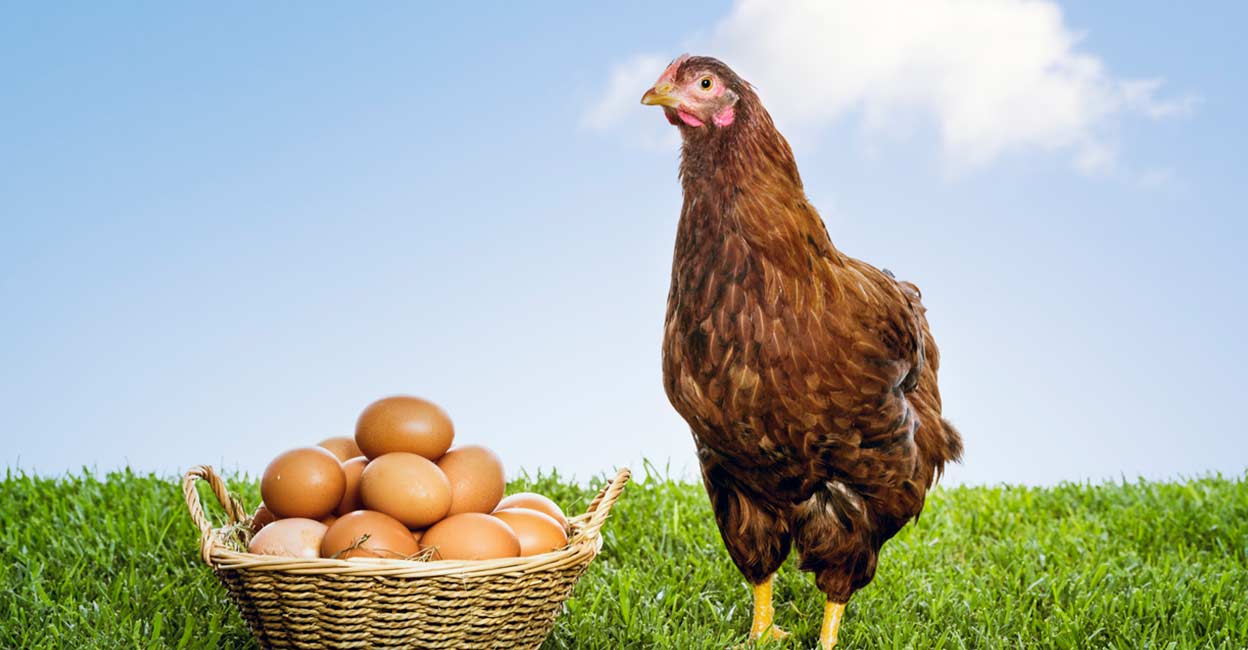Chicken or egg: Which came first?

Mail This Article
Which came first: The chicken or the egg? To answer this age-old question, let’s begin with some stories on the egg. Long before chickens ever existed, eggs were already a part of life on Earth – millions of years ago, in fact! But before we dive into the story of the chicken egg, let’s explore the fascinating history of eggs themselves.
Researchers estimate that the first eggs evolved roughly 500-600 million years ago. At the same time, the first egg with a hard shell appeared around 312 million years ago during the Carboniferous period. Then, about 150 million years ago, the first true bird eggs emerged. Chicken eggs, as we know them today, are the result of evolutionary processes and selective breeding over thousands of years. So, if we’re talking about eggs in general, they definitely existed long before chickens, says Dr. Ellen Mather of Flinders University.
Domesticated chickens
According to researchers, the 'parents' of the first domesticated chickens were hybrids between wild jungle fowl and closely related bird species, such as the grey junglefowl. This also means that the first domesticated chickens actually existed before the first true domesticated chicken eggs were laid.
The history of eggs
Eggs have been around since the dawn of life on Earth. With the exception of most mammals, nearly all animals lay eggs. Nature's preferred way to carry forward genetic inheritance is through eggs, according to Jules Howard, author of Infinite Life, a book exploring the emergence of eggs. Howard speculates that the origin of the first egg was linked to the early evolution of life itself. Eggs serve as vessels, allowing genes to combine in new ways through the fusion of egg and sperm cells.
Before the evolution of eggs, microscopic life forms relied on cloning to reproduce, essentially creating copies of themselves. This method resulted in offspring that were genetically identical to the parent, which meant they had limited genetic diversity and low immunity. As a result, they were vulnerable to attacks from viruses and parasites. Jules Howard explains that with the advent of sexual reproduction inside eggs, a new chapter began. This process paved the way for the emergence of species with unique genetic characteristics, enhancing survival and adaptability.

Generations that didn’t reproduce through intercourse or eggs were more vulnerable to viruses and often faced extinction. Despite this, the first eggs were not quite like the ones we know today. They likely belonged to marine animals like jellyfish or worm-like creatures. If you take the most fundamental view, eggs can be called life-saving capsules, protecting developing life from external threats. Fossils found in China, dating back around 600 million years, reveal that these early eggs were much smaller than those we see today.
Jules Howard said that these tiny eggs, not much thicker than strands of human hair, once floated through ancient seas before settling on the ocean floor. He explains that since life on land had not yet emerged during this period, it is safe to conclude that eggs existed long before chickens. The first eggs on land likely appeared during the Carboniferous period, roughly 312 million years ago, and these early eggs might have belonged to the ancestors of reptiles.
Dr. Ellen speculates that these ancient eggs did not have hard shells. Instead, they might have been similar to the soft eggs laid by modern reptiles like snakes. It was not until the early Jurassic period that the first hard-shelled eggs appeared. Researchers have discovered dinosaur eggs, including those of long-necked sauropods, dating back around 195 million years ago, a time when reptiles and early birds commonly laid eggs.
If these findings are taken altogether, it can be concluded that eggs existed on Earth long before chickens. However, Dr. Ellen points out that this perspective might not satisfy those who define an egg strictly by its hard shell. Similarly, the evidence also suggests that hard-shelled eggs predate chickens by millions of years.

So, what exactly is a chicken?
The first domestic chicken, or fowl, was derived from the red junglefowl, scientifically known as Gallus gallus. Researchers believe that Gallus gallus originated around 50 million years ago, although the process of domestication began much later. It is likely that as humans began cultivating rice and millet near forests, the wild birds started to venture closer to human settlements.
The domestication of chickens must have begun once these wild birds became accustomed to their new human neighbours. Domesticated fowls are believed to have originated from the red junglefowl, with the wild fowl gradually transitioning into the domestic breed. Over time, these domesticated birds evolved into what we now know as Gallus gallus domesticus, or the domestic chicken. Researchers once believed that domesticated chickens first appeared around 10,000 years ago. However, recent analyses suggest that chicken domestication began in Southeast Asia between 1650 and 1250 BCE, or at least 3,300 years ago.
So, which came first; the chicken or the chicken egg?
If we re frame the question to whether the chicken or the chicken egg came first, things become clearer. This age-old dilemma, pondered over by philosophers since Aristotle, can now be answered with the knowledge we have today. The first domesticated chickens descended from jungle fowl parents. In other words, domestic chickens existed before the eggs they laid.
At some point, wild chickens transitioned from their untamed, wild state and became what we recognise as chickens today. The first true chicken would have evolved from a partially domesticated wild chicken. In other words, the first chicken existed before the first domestic chicken egg. As Dr. Ellen states, the answer to whether the domesticated chicken or its eggs came first is clear: it was the chicken.

